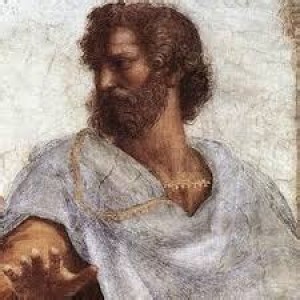
Philosophy Radio! drlabasham777's Podcast
Society & Culture:Philosophy

The Virtue approach to Ethics starts with the person. Not with calculations of overall good (Utilitarianism) or Absolute, inalienable (never to be denied) Rights. What sort of person can be Good? What is there that makes the person a good person. Virtue does. And there are several virtues. You, as a good person, or a insane vicious (dog attack) person, are the totality, the total mix, of these.
So what is virtue? Let's look at Aristotle.
Aristotle asked this question thousands of years ago, and in a long--very long--letter to his Nephew, for brevity let's call him Nico, tried to answer it with The Golden Mean.
The Golden Mean isn't Mean-spirited, it's just living In the Middle, where we find the good people. But in the middle what? Let's talk about a courageous person. A person who risks all for the right and just cause in the moment.
So you're in a scary situation. Now there are two extremes: Not the middle,
a) Stupid, foolish, pointless risk.
And
b) Coward; runs no matter what. No love or respect for others, no risk-taking, stuck on the stupidity of being stuck on themselves. The "well, that's not right for me, I was scared" kind of people.
We may have met both kinds.
So what is the Middle between (a) and (b)?
1) Chance of success exists, and success is urgent. Others might be deeply harmed, even killed.
2) Risk to self is serious, is real, even catastrophic; you might die.
So 3) You do it.
There's our Middle. It identifies a type, a manner, of Virtue. And we call those people Brave. They have Valor.
This is Aristotle's approach to all of life. It's interesting that he said the greatest Virtue of all was being what, as we translate from ancient Greek into English, being "Magnanimous". Being a Great Soul, as Mahatma Gandhi might put it. In our terms; wise, watchful and also Forgiving.
More about this as we continue our adventure! Please read the following. Aristotle is a friend.
Cheers~
Dr. Lee Basham
THE GOLDEN MEAN IN ARISTOTLE’S NICOMACHEAN ETHICS
Each moral virtue is a mean or lies between extremes of pleasure or of action ‐‐ doing or feeling too much or too little. The absolute mean is different from the mean as it is relative to the individual. For example, the intermediate between two pounds and ten pounds of food is (absolutely) six pounds, but the mean relative to the individual will be different for the athlete than it is for the non‐athlete. Morality, like artwork, requires that one neither under‐do nor over‐do. One must hit upon the right course (steering between too much and too little). This requires practice. Virtues are good habits or dispositions to do the right thing developed by means of particular virtuous acts. Means themselves do not admit of excess and deficiency (one cannot have too much courage, etc.).
Good judgment requires that one find the mean between extremes. In order to do that, one must have both general knowledge and particular experience. Practical wisdom is the intellectual virtue (intellectual virtues are higher than moral virtues), which governs deliberation and action. Here are some examples of the golden mean taken from Aristotle'sNicomachean Ethics (Book II):
VICE (DEFECT)
VIRTUE (MEAN)
VICE (EXCESS)
Cowardice (too little confidence)
Courage
Rashness (too much confidence)
Foolhardiness (too little fear)
Courage
Cowardice (too much fear)
Insensibility (too little pleasure)
Temperance
Self‐indulgence (too much pleasure)
Meanness or Stinginess (too little giving)
Liberality
Prodigality or Wastefulness (too much giving)
Stinginess (in giving out large sums of money)
Magnificence
Tastelessness and Vulgarity (giving out large sums)
Undue Humility (too little honor)
Proper Pride
Empty Vanity (too much honor)
Inirascibility (too little anger)
Good Temper
Irascible (too much anger)
Shamelessness (too little shame)
Modesty
Bashfulness (too much shame)
Surliness
Friendliness
Flattery
More Episodes
 2022-02-21
2022-02-21
 28
28
 2022-02-09
2022-02-09
 34
34
 2022-01-17
2022-01-17
 70
70
 2021-12-29
2021-12-29
 45
45
 2021-12-25
2021-12-25
 28
28
 2021-12-22
2021-12-22
 24
24
 2021-12-20
2021-12-20
 32
32
 2021-12-17
2021-12-17
 22
22
 2021-12-15
2021-12-15
 20
20
 2021-12-09
2021-12-09
 66
66
 2021-12-09
2021-12-09
 42
42
Create your
podcast in
minutes
- Full-featured podcast site
- Unlimited storage and bandwidth
- Comprehensive podcast stats
- Distribute to Apple Podcasts, Spotify, and more
- Make money with your podcast
It is Free
- Privacy Policy
- Cookie Policy
- Terms of Use
- Consent Preferences
- Copyright © 2015-2024 Podbean.com





